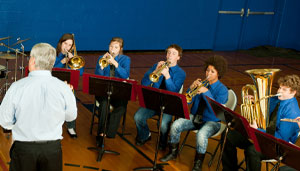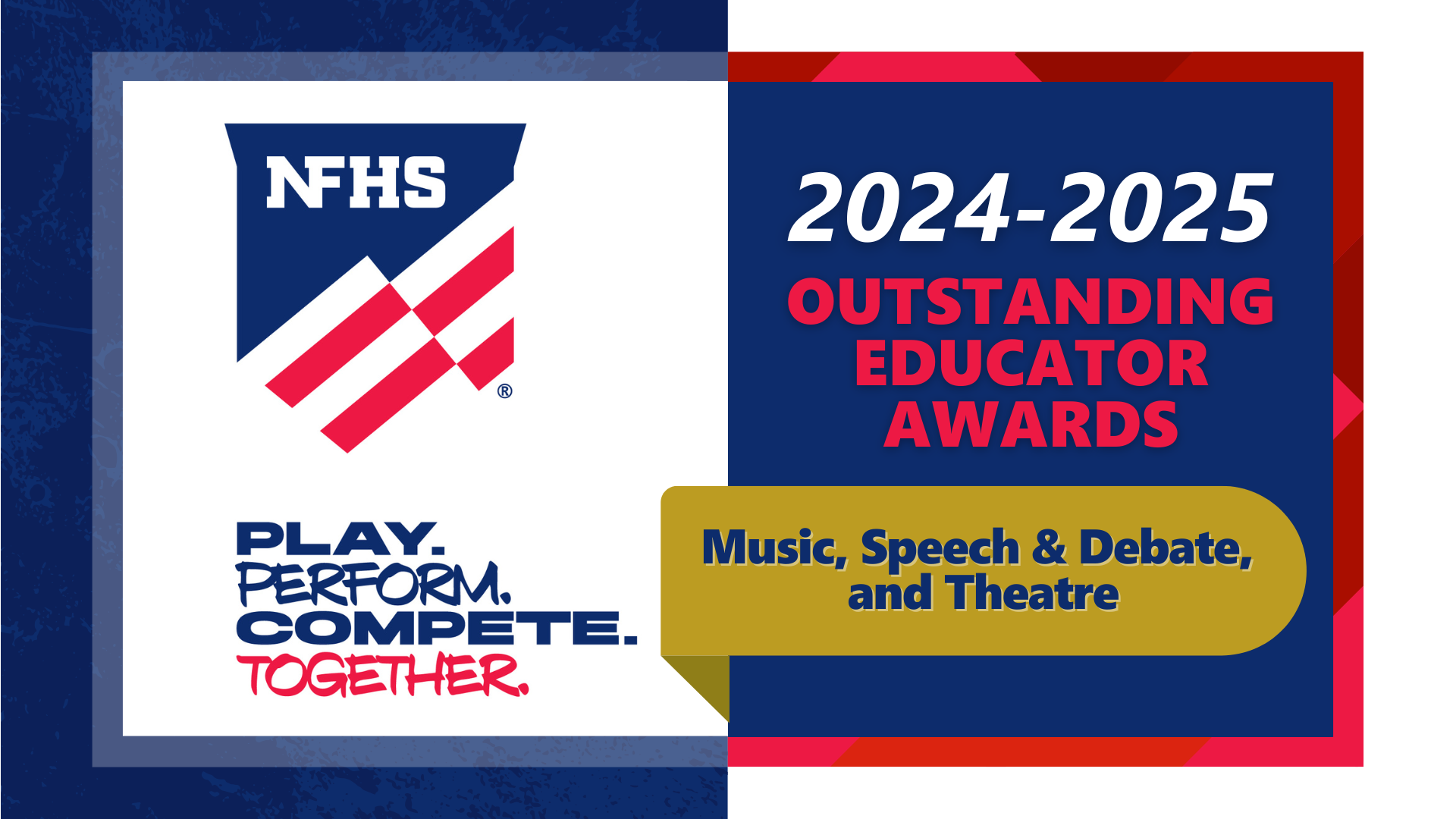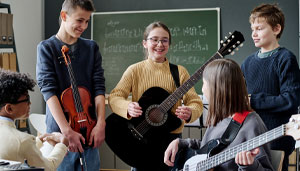Unprecedented International Coalition led by Performing Arts Organizations to Commission COVID-19 Study
By on February 28, 2023 music directors & adjudicators article Print8/15 Update
Disclaimer: All information provided through the study is to be used strictly for general consideration. This information will be updated (NEWEST MATERIAL AT THE TOP) when it becomes available, please share the link to this webpage instead of the individual documents.
Dr. James Weaver (NFHS) and Dr. Mark Spede (CBDNA/Clemson) talk about the Spring 2022 survey study done to determine the effect of recommended COVID-19 prevention strategies in performing arts classrooms in the U.S. during the Fall 2021 semester when the primary COVID-19 variant was the Delta strain.
COVID Prevention Strategies among Music Programs - Study with CDC (August 4th)
(Video / Infographic / Paper)
In the Spring of 2022, the NFHS, CBDNA, and the International Aerosol Study Coalition embarked on a collaborative study with the Centers for Disease Control and Prevention (CDC) to determine the effect of recommend COVID-19 prevention strategies in the performing arts classrooms during the Fall 2021 Semester.
The NFHS distributed an electronic survey to staff who direct bands, orchestras, choirs, and general music programs in the K-12 school and collegiate settings. The objective of the survey was to collect information on which mitigations were implemented in music programs from August 1-December 15, 2021. Surveys were sent to a nationwide sample, and 4,808 staff responded.
Watch the 3-Minute Results Analysis Video
This study allows us to better understand mitigations used by secondary and higher education music programs across the United States during August 1–December 15, 2021. The COVID-19 pandemic forced music programs across the country to rethink how and where to practice and whether to perform or participate in competitions. Most respondents (80%) reported their music program implemented mitigations, with an average of three mitigations implemented at once.

Updated Guidelines for March 2022 (March 15th)
As the United States’ national guidance changes and states remove masking requirements in schools performing arts programs guidance will continue to change and adapt. Importance will need to be placed on local and state respiratory disease transmission rates for use of mitigations. Performing Arts programs should follow the same recommendations that are implemented for the rest of the school. If masks and distancing are required in a school, the mitigations below should be used to ensure the continuation of performing arts programs. If masks and distancing are optional or not used, performing arts programs may forgo mitigations as well.
Music Program - COVID Check In Survey #2 (February 15th)
The purpose of the survey is to identify and track how secondary and higher education music programs across the United States have been impacted during the COVID pandemic. Your participation in this survey will provide valuable, timely insights that will help inform ways to better support music programs. To be eligible to complete the survey, you must have taught or directed a K-12 or collegiate music program in the United States from August 1st – December 15th, 2021. The survey should take only about 5 minutes to complete.
Updated Guidelines for February 2022 (February 10th)
Importance will need to be placed on local and state respiratory disease transmission rates for use of mitigations. These suggestions are meant to provide some best practices as we continue to move into new phases in the pandemic. It is important to know and understand your state and local health department guidance.
It's OK to Play Music - Helpful Infographic (November 8th)
Click to access the infographic link. Make sure to click on all of the pictures and the header for helpful information and graphs to appear.
Link to share: https://bit.ly/NFHSAerosolCOVID
New Published Paper as Aerosol Study Continues (August 31st)
“Measurements and Simulations of Aerosol Released while Singing and Playing Wind Instruments”
A variety of methods were used in this study, including flow visualization, aerosol and CO2 measurements, and computational fluid dynamics (CFD) modeling to understand the different components that can lead to transmission risk from musical performance and risk mitigation.
A Conversation on Mitigations for Fall 2021 (Speech, Debate, Theatre, Music, and more!) (August 27th)
Dr. James Weaver (NFHS), Dr. Mark Spede (CBDNA/Clemson), and Bob Morrison (Arts Ed New Jersey) have an in-depth conversation on mitigations and recommendations for various music, speech, debate, and theatre activities. This conversation is a view of best practices on the date of this recording and any action should be in consultation with your local and/or state health departments.
Updated Guidelines for Fall 2021 Activities (August 12)
These suggestions are meant to provide some best practices.
Assessing the Risk of Music Activities During the COVID-19 Pandemic (June 23)
A survey was conducted beginning April 28, 2021 to assess the level of spread events that occurred in school-based music programs. 3,000 surveys were returned and analyzed in June 2021. Click the link above to read the report.
COVID-19 Mitigation Strategies for Choir - Short Video (April 30th)
COVID-19 Mitigation Strategies for Percussion - Short Video (April 30th)
COVID-19 Mitigation Strategies for String Instruments - Short Video (April 30th)
COVID-19 Mitigation Strategies for Wind Instruments - Short Video (April 21st)
Learn about the COVID-19 mitigation strategies developed from the research done at the University of Colorado and the University of Maryland in the Wind Instrument Aerosol Study.
Scientific Study Prepress Paper (40+ Pages) (April 15th)
A scientific preprint of the research paper: "Measurements and Simulations of Aerosol Released while Singing and Playing Wind Instruments" based off the aerosol study is now available for public consumption as it is peer reviewed for publication in a scientific journal.
"Band Practice in the Age of COVID-19" - article from the Wall Street Journal (April 14th)
An article written based off the results and recommendations from the aerosol study with quotes, links, visuals and animations is available to read and share.
The U.S. Department of Education has put out a call for real-life examples of successful back-to-school risk management practices for pre-k through college classrooms that will then be available to teachers and administrators in a clearinghouse as they plan to return to in-person learning.
Updated Statement on United States CDC Distancing Guidance (March 19th)
3rd Release of Preliminary Results (shared on November 13th at 1pm Eastern)
| Written Report of Data |
| Video Conversation of Results (with Lead Researchers and Co-Chairs) |
| Let's Talk About Transmission (Video) |
| NFHS Press Release on 3rd Round of Data |
*Have a question? Want to leave a comment? Please visit the FAQ page*
2nd Release of Preliminary Results were shared August 6th
Preliminary results for woodwinds and brass were released July 13th
*Have a question? Want to leave a comment? Please visit the FAQ page*
A number of performing arts organizations have joined forces to commission a study on the effects of COVID-19 on the return to the rehearsal hall. It is important to understand what risks exist in performing arts classrooms and performance venues. Specifically, the study will examine aerosol rates produced by wind instrumentalists, vocalists, and even actors, and how quickly those aerosol rates accumulate in a space. Although not yet proven, strong anecdotal evidence suggests that the COVID-19 virus can travel in the microscopic droplets expelled from a person with the virus, even when asymptomatic. The only way to determine what risk level exists or to create best practices for reducing infection risk is to understand how aerosol disbursement works in a performing arts setting.
Once the aerosol rates are better understood, the study will focus on remediation of aerosols in confined spaces like rehearsal rooms (both educational and professional), classrooms, and performance settings in order to develop better understanding, policy, and practice for a safe returning to performance and education.
Dr. Shelly Miller at the University of Colorado will lead the scientific study and says, “Aerosol generating activities have the potential to transmit COVID as the research shows, but we have very little data on what kinds of generation happen when playing instruments. We will be studying this phenomenon (hopefully with funding) in our aerosol laboratory at the University of Colorado Boulder and with this data, will be able to provide better evidence-based guidance.”
Several national and international performing arts education organizations are combining resources to study the effects of COVID-19 aerosol transmission in performing arts performance settings. The study is a massive undertaking that will require a focused effort from all of us. This effort will be a duplicated study and will test how aerosols can spread from brass and woodwind instruments, the four vocal ranges, theatrical speech, and aerobic breathing. We are calling on any performing arts educational organization to join our research council. Your organizational support is the most important. Together we can create scientifically proven methods for our return to performing arts education in a safe way with research showing us best practices and advocacy.
The coalition is being led by a committee made up of the following:
Co-Chairs
-Mark Spede, President of the College Band Directors National Association (CBDNA) and Director of Bands, Clemson University
-James Weaver, Director of Performing Arts and Sports, National Federation of State High School Associations (NFHS)
The organizations in the coalition to date include:
*College Band Directors National Association (CBDNA)
*National Association of Music Merchants (NAMM)
*National Federation of State High School Associations (NFHS)
*D’Addario Foundation
*Alabama Music Educators Association
*American Choral Directors Association (ACDA)
*American School Band Directors Association (ASBDA)
American String Teachers Association (ASTA)
*Arts Ed NJ
Arts Education in Maryland Schools (AEMS)
*Athletes and the Arts
Association Européenne des Conservatoires/Académies de Musique et Musikhochschulen (AEC)
*Association for Body Mapping Education
*Association of Anglican Musicians (AAM)
*Association of Concert Bands
*Barbershop Harmony Society
Buffet et Crampon
Bundesverband der deutschen Musikinstrumentenhersteller e.V
*California Youth Symphony Association
*Canadian Band Association (CBA)
Chicago Children's Choir
Children's Chorus of Washington
*Choral Canada
Chorus America
*Church Music Publishers Association (CMPA)
*College Orchestra Directors Association (CODA)
Confederation of European Music Industries (CAFIM)
*Country Music Association Foundation
Drum Corps International (DCI)
Educational Theatre Association (EdTA)
European Choral Association - Europa Cantat
*Fargo-Moorhead Orchestral Association
*Florida Music Education Association (FMEA)
*French Musical Instrument Organisation (La Chambre Syndicale de la Facture Instrumentale, CSFI)
*Gala Choruses
*Halifax Concert Band Society
HBCU National Band Directors' Consortium
High School Directors National Association (HSBDNA)
*Indiana Choral Directors Association
*Indiana State School Music Association
*Indianapolis Children's Choir
International Conductors Guild
*International Double Reed Society (IDRS)
*International Music Council
International Society for Music Education
*Kansas Bandmasters Association (KBA)
*Kappa Kappa Psi
*Kentucky Music Educators Association (KMEA)
*Lakeville Area Community Band
*League of American Orchestras
*Lesbian & Gay Band Association
Louisiana Music Educators Association (LMEA)
*Maine Music Educators Association (MMEA)
*Manitoba Band Association
*Mid Penn Band Organization
MidWest Clinic
Minority Band Directors National Association
*Music Association of California Community Colleges (MACCC)
*Music for All
Music Industries Association
*Music Learning Band Program
*Music Teachers National Association (MTNA)
*Music Publishers Association
Musical America Worldwide
*National Association for Music Education (NAfME)
*National Association of Teachers of Singing (NATS)
*National Collegiate Choral Organization (NCCO)
National Dance Education Organization (NDEO)
National Flute Association (NFA)
*National Guild for Community Arts Education
*National Music Council of the US
*National Speech and Debate Association (NSDA)
*New Horizons International Music Association (NHIMA)
*New York State Band Directors Association
*New York State School Music Association (NYSSMA)
*North Carolina Music Educators Association
*Nova Scotia Band Association
*Oahu Band Directors Association
*Ohio Foundation for Music Education (OFME)
*Ohio Music Education Association (OMEA)
*Opera America
*Orcas Island Community Band
*Orchestras Canada/Orchestres Canada
*Organization of American Kodály Educators (OAKE)
Percussive Arts Society (PAS)
*Performing Arts Medicine Association (PAMA)
*Phi Mu Alpha Sinfonia
*Quadrant Research
*Saskatchewan Band Association
Save the Music Foundation
*Sigma Alpha Iota Philanthropies
*Sing A Mile High International Children’s Choral Festival
*Slate Valley Singers
*Songwriters Guild of America (SGA)
*South Dakota Bandmasters Association
*South Dakota Music Education Association
*Surrey Music Educators Association
*Sweet Adelines International (SAI)
*Tau Beta Sigma
*Tennessee Music Education Association (TMEA)
*Texas Bandmasters Association
*Texas Music Educators Association (TMEA)
*The College Music Society and The CMS Fund
*The Main Street Singers, Inc (Main Street Children’s Choir)
*The National Catholic Band Association
*The Sinfonia Educational Foundation
*The Voice Foundation
United Sound
*Virginia Music Educators Association
*Voice and Speech Trainers Association (VASTA)
WGI Sport of the Arts
*Wisconsin School Music Association
*Women Band Directors International (WBDI)
*World Association for Symphonic Bands and Ensembles (WASBE)
*Young Voices of Colorado
Collegiate Conference Band Associations:
*ACC Band Directors Association
*Big 12 Band Directors Association
*Big 10 Band Directors Association
*PAC 12 Band Directors Association
*SEC Band Directors Association
Individual Schools:
*Clemson University Bands
*Linn-Benton Community College
*UCLA
*Utah
Supporters:
*Bob Morrison
*Bob Rogers Travel
*Conn-Selmer
*D’Addario Woodwinds
* Organizations have provided financial support
(Updated as of 8/17/20 at 2:30 PM)
For more information or questions contact, please visit the FAQ webpage.
Here's a collection of articles and studies relating to COVID-19 that pertain to our study:
https://drive.google.com/drive/u/1/folders/1PZ8RF3EytzUWGwfJNpu4fsyXc4E_u2Yi
Study Co-Chairs:
Dr. Mark Spede (CBDNA)
Dr. James Weaver (NFHS)
Lead Researchers:
Dr. Shelly Miller (University of Colorado Boulder)
Dr. Jelena Srebric (University of Maryland)
Please click here for more extensive bios on the individuals mentioned above.


Most Recent Articles
- 2025 Performing Arts Education and Creative Industry Meeting Materials
- Boys Lacrosse Season Preview - 2025
- Girls Lacrosse Season Preview - 2025
- nfhs news Risk Minimization Focus of 2025-26 High School Spirit Rules Changes
- nfhs news Supporting High Schools, State Associations to Determine Eligibility, Transfer Rules









